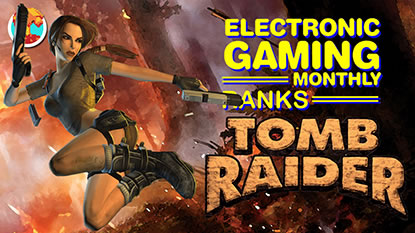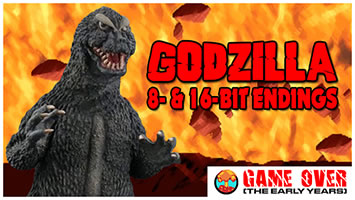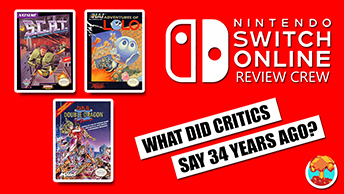- CLASSIC MAGAZINES
- REVIEW CREW
A show recapping what critics thought back
when classic games first came out! - NEXT GENERATION'S BEST & WORST
From the worst 1-star reviews to the best
5-stars can offer, this is Next Generation! - NINTENDO POWER (ARCHIVE)
Experience a variety of shows looking at the
often baffling history of Nintendo Power! - MAGAZINE RETROSPECTIVE
We're looking at the absolutely true history of
some of the most iconic game magazines ever! - SUPER PLAY'S TOP 600
The longest and most ambitious Super NES
countdown on the internet! - THEY SAID WHAT?
Debunking predictions and gossip found
in classic video game magazines! - NEXT GENERATION UNCOVERED
Cyril is back in this spin-off series, featuring the
cover critic review the art of Next Generation! - HARDCORE GAMER MAGAZING (PDF ISSUES)
Download all 36 issues of Hardcore Gamer
Magazine and relive the fun in PDF form!
- REVIEW CREW
- ELECTRONIC GAMING MONTHLY
- ELECTRONIC GAMING MONTHLY RANKS
From Mario to Sonic to Street Fighter, EGM
ranks classic game franchises and consoles! - ELECTRONIC GAMING MONTHLY BEST & WORST
Counting down EGM’s best and worst reviews
going year by year, from 1989 – 2009! - ELECTRONIC GAMING BEST & WORST AWARDS
11-part video series chronicling the ups and
downs of EGM’s Best & Worst Awards!
- ELECTRONIC GAMING MONTHLY RANKS
- GAME HISTORY
- GAME OVER: STORY BREAKDOWNS
Long-running series breaking down game
stories and analyzing their endings! - A BRIEF HISTORY OF GAMING w/ [NAME HERE]
Real history presented in a fun and pithy
format from a variety of game historians! - THE BLACK SHEEP
A series looking back at the black sheep
entries in popular game franchises! - INSTANT EXPERT
Everything you could possibly want to know
about a wide variety of gaming topics! - FREEZE FRAME
When something familiar happens in the games
industry, we're there to take a picture! - I'VE GOT YOUR NUMBER
Learn real video game history through a series
of number-themed episodes, starting at zero! - GREAT MOMENTS IN BAD ACTING
A joyous celebration of some of gaming's
absolute worst voice acting!
- GAME OVER: STORY BREAKDOWNS
- POPULAR SHOWS
- DG NEWS w/ LORNE RISELEY
Newsman Lorne Riseley hosts a regular
series looking at the hottest gaming news! - REVIEW REWIND
Cyril replays a game he reviewed 10+ years
ago to see if he got it right or wrong! - ON-RUNNING FEUDS
Defunct Games' longest-running show, with
editorials, observations and other fun oddities! - DEFUNCT GAMES QUIZ (ARCHIVE)
From online quizzes to game shows, we're
putting your video game knowledge to the test!- QUIZ: ONLINE PASS
Take a weekly quiz to see how well you know
the news and current gaming events! - QUIZ: KNOW THE GAME
One-on-one quiz show where contestants
find out if they actually know classic games! - QUIZ: THE LEADERBOARD
Can you guess the game based on the classic
review? Find out with The Leaderboard!
- QUIZ: ONLINE PASS
- DEFUNCT GAMES VS.
Cyril and the Defunct Games staff isn't afraid
to choose their favorite games and more! - CYRIL READS WORLDS OF POWER
Defunct Games recreates classic game
novelizations through the audio book format!
- DG NEWS w/ LORNE RISELEY
- COMEDY
- GAME EXPECTANCY
How long will your favorite hero live? We crunch
the numbers in this series about dying! - VIDEO GAME ADVICE
Famous game characters answer real personal
advice questions with a humorous slant! - FAKE GAMES: GUERILLA SCRAPBOOK
A long-running series about fake games and
the people who love them (covers included)! - WORST GAME EVER
A contest that attempts to create the worst
video game ever made, complete with covers! - LEVEL 1 STORIES
Literature based on the first stages of some
of your favorite classic video games! - THE COVER CRITIC
One of Defunct Games' earliest shows, Cover
Critic digs up some of the worst box art ever! - COMMERCIAL BREAK
Take a trip through some of the best and
worst video game advertisements of all time! - COMIC BOOK MODS
You've never seen comics like this before.
A curious mix of rewritten video game comics!
- GAME EXPECTANCY
- SERIES ARCHIVE
- NINTENDO SWITCH ONLINE ARCHIVE
A regularly-updated list of every Nintendo
Switch Online release, plus links to review! - PLAYSTATION PLUS CLASSIC ARCHIVE
A comprehensive list of every PlayStation
Plus classic release, including links! - RETRO-BIT PUBLISHING ARCHIVE
A regularly-updated list of every Retro-Bit
game released! - REVIEW MARATHONS w/ ADAM WALLACE
Join critic Adam Wallace as he takes us on a
classic review marathon with different themes!- DEFUNCT GAMES GOLF CLUB
Adam Wallace takes to the links to slice his way
through 72 classic golf game reviews! - 007 IN PIXELS
Adam Wallace takes on the world's greatest spy
as he reviews 15 weeks of James Bond games! - A SALUTE TO VAMPIRES
Adam Wallace is sinking his teeth into a series
covering Castlevania, BloodRayne and more! - CAPCOM'S CURSE
Adam Wallace is celebrating 13 days of Halloween
with a line-up of Capcom's scariest games! - THE FALL OF SUPERMAN
Adam Wallace is a man of steel for playing
some of the absolute worst Superman games! - THE 31 GAMES OF HALLOWEEN
Adam Wallace spends every day of October afraid
as he reviews some of the scariest games ever! - 12 WEEKS OF STAR TREK
Adam Wallace boldly goes where no critic has
gone before in this Star Trek marathon!
- DEFUNCT GAMES GOLF CLUB
- DAYS OF CHRISTMAS (ARCHIVE)
Annual holiday series with themed-episodes
that date all the way back to 2001!- 2015: 30 Ridiculous Retro Rumors
- 2014: 29 Magazines of Christmas
- 2013: 29 Questionable Power-Ups of Christmas
- 2012: 34 Theme Songs of Christmas
- 2011: 32 Game Endings of Christmas
- 2010: 31 Bonus Levels of Christmas
- 2009: 30 Genres of Christmas
- 2008: 29 Controls of Christmas
- 2007: 34 Cliches of Christmas
- 2006: 33 Consoles of Christmas
- 2005: 32 Articles of Christmas
- 2004: 31 Websites of Christmas
- 2003: 29 Issues of Christmas
- 2002: 28 Years of Christmas
- 2001: 33 Days of Christmas
- NINTENDO SWITCH ONLINE ARCHIVE
- REVIEW ARCHIVE
- FULL ARCHIVE
What's the Best Reviewed Game on The Disney Afternoon Collection?
This is the Disney Afternoon Collection, a brand new classic game compilation from Capcom. It's coming to PlayStation 4, Xbox One and Windows PC on April 18 and features six games based on the hugely popular Disney Afternoon cartoons that ran in the late 1980s and early 90s.
To help celebrate this upcoming release, I wanted to take a look back at what critics said about games like DuckTales, Chip 'n Dale Rescue Rangers and Darkwing Duck when they were first released. We're going to dig through the pages of Electronic Gaming Monthly, GamePro, Nintendo Power and even N-Force to figure out the ranking for the six games featured in this collection. Join me as I average the scores to figure out which games in The Disney Afternoon Collection were best.






To help celebrate this upcoming release, I wanted to take a look back at what critics said about games like DuckTales, Chip 'n Dale Rescue Rangers and Darkwing Duck when they were first released. We're going to dig through the pages of Electronic Gaming Monthly, GamePro, Nintendo Power and even N-Force to figure out the ranking for the six games featured in this collection. Join me as I average the scores to figure out which games in The Disney Afternoon Collection were best.
Disney's TaleSpin

Of all the Disney Afternoon games featured in this collection, TaleSpin is probably the least known. There may be a reason for that. This 1991 NES game was released immediately after both DuckTales and Chip 'n Dale Rescue Rangers, two well-regarded platformers that went on to define Capcom's Disney Afternoon series. Compared to those two, TaleSpin is a bit of a dud, and the few critics that actually reviewed the game at the time were left underwhelmed.
N-Force argued that the shoot-em-up offered nicely drawn cartoon graphics and solid gameplay, but suspected that most fans of the show would ultimately be left disappointed. Nintendo Power was a bit more generous, giving the game strong scores for graphics and gameplay, but complained that it was too easy and not for the more experienced shooter fans. The result was a so-so 69% average, making this one of Capcom's weaker efforts.
Disney's DuckTales 2

After the success of DuckTales, Capcom was quick to expand their Disney Afternoon series with TaleSpin, Darkwing Duck and Chip 'n Dale Rescue Rangers, most of which were met with great reviews and strong sales. Frustratingly, it took them four years to deliver a sequel to DuckTales, which meant it came out three years after the show had wrapped production (or 24 years early, if you want to bring up the new series). By this point critics had largely moved on from the simplicity of 8-bit platformers, and thus were not as willing to overlook some of the game's more outdated problems.
Video Games & Computer Entertainment gave DuckTales a 6 out of 10, complaining that it was "more of the same." The complained that you "may find that DuckTales 2 isn't very different from dozens of other games derived from the same formula." GamePro echoed those thoughts, but liked it more than most. "If it's more of the same you want, DuckTales 2 delivers." They gave it a 4 out of 5, ultimately recommending it for "first-time players" and fans of the show.
Electronic Gaming Monthly fit somewhere in the middle, with the magazine giving the game straight 7s. Ed Semrad argued that "DuckTales 2 is enough to make you want to dig out your NES again," while Martin Alessi noted that it's "a great example that 16-bit graphics and high Meg counts are not necessary for a great game." Sushi-X, on the other hand, left us with this baffling question: "Who said third-party companies should make games that justify holding on to your NES anyway?" Um ... I don't know?
Disney's Chip 'n Dale Rescue Rangers 2

Much like DuckTales 2, the sequel to Chip 'n Dale Rescue Rangers came out four years after the original. Not only was this an eternity for an 8-bit licensed platformer, but it also meant that it was one of the very last games released on the Nintendo Entertainment System. To put it in perspective, Rescue Rangers 2 came out only a year before the PlayStation and Saturn hit the market. As a result, very few people had a chance to play this game, making it something of a collector's item these days.
Not knowing the game would be so sought-after two decades later, Electronic Gaming Monthly gave this sequel scores ranging from 6 all the way up to 8. They argued that "Rescue Rangers 2 comes off rather well and, if anything, makes you wish for a 16-bit version." Video Games magazine gave the sequel a 7 out of 10, noting that while it "may not live up to the high standards of its predecessor, it's not bad for an all-new NES title." That sounds like a back-handed compliment to me.
Of all the classic video game magazines, GamePro and Game Players were the kindest to Rescue Rangers 2. GamePro praised the graphics and sound, giving it a 4.5 out of 5. Game Players, on the other hand, noted the simplicity, but said the "hard bosses compensate." They gave it an 84%. Unfortunately, this wasn't enough to offset the lower scores, and Chip 'n Dale Rescue Rangers 2 ultimately averaged a 75%.
Disney's Chip 'n Dale Rescue Rangers

When Disney went to follow-up the hugely successful DuckTales cartoon, they decided to go with Chip 'n Dale Rescue Rangers, a fun crime-fighting series starring chipmunks names after an 18th century cabinet maker. When Capcom went to follow-up their hugely DuckTales game, they decided to go a similar route, giving us a two-player NES title based on the much-loved Rescue Ranger series. This should have been a perfect match, but not every critic agreed.
British mag N-Force gave it the lowest score and called it a "bit of an eyesore." "There's no denying that with good presentation, a tested formula works. Unfortunately, that's where this offering falls down." They also griped about the crummy collision detection before giving it a 66%. They were much harsher than most magazines at the time, but that's not to say the other critics didn't find problems with Rescue Rangers.
Electronic Gaming Monthly's Steve Harris complained that, like other Disney games, "Capcom has hurt a great cart by making it too easy." Ed Semrad disagreed, saying that it's "a player's game" and calling it "outstanding because of its true-to-Disney animation and good control." The magazine gave it a couple of 7s, an 8 and even a 9 out of 10. You also saw strong scores from Nintendo Power and Mean Machines, who gave the game a 4 out of 5 and 88% respectively. Chip 'n Dale Rescue Rangers averaged a score of 77%.
Disney's Darkwing Duck

Of all the Disney Afternoon cartoons, Darkwing Duck is the one that makes the most sense as a video game. Sure, Scrooge McDuck was fond of adventure and Chip 'n Dale fought crime, but Capcom had to basically turn them into superheroes in order to make an action game out of their exploits. Darkwing Duck, on the other hand, was already a superhero, so Capcom had no problem turning his game into a fun Mega Man knock-off.
GamePro praised the game, calling it "great 8-bit action entertainment." "Capcom usually leads the charge into NES gaming fun, and Darkwing makes his move with flying colors." They gave this 1992 action game a perfect 5 out of 5. Nintendo Power gave it a lower score, but still said that it was one of the best action games on the NES. N-Force was a little more negative, but still had nice things to say. They gave it a 77% and concluded that it wasn't exactly ground breaking, but did offer a nice challenge, had a good sense of humor and offered smooth animation. They even used a duck pun that I'm not going to say here, because it's groan-worthy. It all averaged out to a solid 83%.
Disney's DuckTales

There's nothing strange about Capcom buying up the license for a popular Disney cartoon. That's to be expected. What is strange is how well that licensed game turned out. You have to remember that this was 1989, and you could count on one hand the number of must-own games based on TV shows. But Capcom defied the odds, giving us a great game that kickstarted a popular string of games based on Disney Afternoon properties.
Critics were impressed with this Capcom game, giving it mostly 8s and 9s. Electronic Gaming Monthly called it "the best game ever made for the young player," while Mean Machines said that "DuckTales contains some of the most exciting graphics I've seen on the Nintendo." Even Nintendo Magazine System loved the game, describing Scrooge's plight as trying to save his "massive bank balance from a fate worse than Gary Harrod's financial affairs." I guess that joke would make more sense if I lived in the UK in the early 1990s.
But not every review was as kind, with Raze complaining that it's "a shame more wasn't made of such a great Disney character." Even Electronic Gaming Monthly's Sushi-X complained about the toned down difficulty: "While I'm sure this is nice for kid brother or sister, you'll probably enjoy the game but find it beaten after the first day of play." That seemed to be the theme throughout the old school reviews. Many complained that it was too easy and aimed squarely at children. As somebody who played through it recently, I'm not sure I agree with this assessment. But hey, I was a kid when it came out, so I guess I was the target audience. I'm probably biased.
HOME |
CONTACT |
NOW HIRING |
WHAT IS DEFUNCT GAMES? |
NINTENDO SWITCH ONLINE |
RETRO-BIT PUBLISHING
Retro-Bit |
Switch Planet |
The Halcyon Show |
Same Name, Different Game |
Dragnix |
Press the Buttons
Game Zone Online | Hardcore Gamer | The Dreamcast Junkyard | Video Game Blogger
Dr Strife | Games For Lunch | Mondo Cool Cast | Boxed Pixels | Sega CD Universe | Gaming Trend
Game Zone Online | Hardcore Gamer | The Dreamcast Junkyard | Video Game Blogger
Dr Strife | Games For Lunch | Mondo Cool Cast | Boxed Pixels | Sega CD Universe | Gaming Trend
Copyright © 2001-2025 Defunct Games
All rights reserved. All trademarks are properties of their respective owners.
All rights reserved. All trademarks are properties of their respective owners.
























